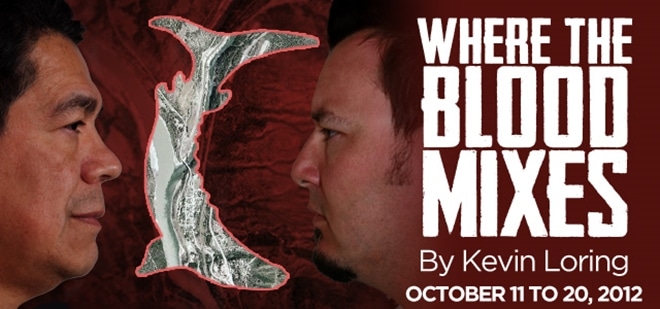Where the Blood Mixes: Revealing the wounds of Residential Schools
Kevin Loring’s play voices the intergenerational traumas haunting the Indigenous Peoples of Canada.
Jen and I met at the Young Centre for the Performing Arts in the Distillery District in Downtown Toronto. It was a windy day for mid-June, and Jen was back for the summer from her Master’s in Art History at McGill. We’d been working together as Research Assistants for a year—she was my late-night SOS text when I needed to cure my imposter syndrome.
Our supervisor had recommended a play that was in town for a couple weeks. Unbeknownst to us, we’d spend the next hour and a half crying in the second row of an almost-empty theatre (it was half-capacity night)—which was fortunate, as we got to coat the red velvet floors in our salty tears and running snot in peace.
Kevin Loring’s play Where the Blood Mixes premiered in 2008 at the Factory Theatre in Toronto where it was immediately awarded the Governor General’s Award. The play—co-produced by Canada’s oldest Indigenous theatre company, Native Earth Performing Arts—returned to Toronto this past June.
Set in the village of Kumsheen, Loring’s hometown, the setting gives the play its name. “Most people say it means the place where the rivers meet,” says a character in the play. “But an elder once told me that the real meaning is ‘the place inside the heart where the blood mixes.’”
Where the Blood Mixes centres around Floyd’s struggle from the loss of his wife—which led to his daughter, Christine, being taken by child services. For two decades, Floyd struggles to face his never forgotten traumas, until his daughter writes to him, desperately searching for a way back home.
The play stages a complex story of healing as a town, a family, and a community is haunted by the horrors of St. George’s Residential School. Throughout the play, Floyd and his childhood friend Mooch, confront their silenced pasts, and emerge from the veils of grief. They spend their time fishing, gambling, and being scolded for their actions by Mooch’s wife, June.
The frigid realities left behind by the Canadian Residential School system bear deep wounds. Art allows for truth to surface, for the unheard to be heard. The play situates audiences of non-Indigenous descent at the sidelines of truth—experiencing something misunderstood and seldom remembered.
Opening up about abuse within the Residential School system, Mooch says: “Don’t matter how long ago it was. It happened yesterday, it happened today, it’ll happen tomorrow. Every day is every day.” He turns to Floyd, trying to understand why it was illegal to see his parents, and why he was filled with an immeasurable sense of guilt.
At the end of the performance, there was silence in the audience. We held our breath, before a standing ovation erupted across the theatre. Jen and I left the room with crumbs of mascara on the apples of our flushed cheeks.
Loring is a Nlaka’pamux and was born in the Lytton First Nation in British Columbia. He is a graduate of the Studio 58 program from Langara College’s School of Theatre Arts in Vancouver. The Nlaka’pamux Nation Tribal Council live by the fundamental law that if “you take care of the land, the land will take care of you.” The relationships between person and land are the backbone of the play—the land healing each character.
Where the Blood Mixes is an emotional narrative that exposes Loring’s First Nation heritage and celebrates survivors. Although non-Indigenous people will never understand the traumas of the Residential School system, Kevin Loring’s production and storytelling peels back the first layer of the scab, allowing us to peak at the depth of the cut below the surface.
The script was also published as a 96-page paperback to equal critical success.
Editor-in-Chief (Volume 48 & 49) | editor@themedium.ca — Liz is completing a double major in Chemistry and Art History. She previously served as Features Editor for Volume 47, and Editor-in-Chief for Volume 48. Liz is extremely excited to have spent her time as an undergrad at The Medium, and can’t wait to inspire others and be inspired in her final year at UTM. When she’s not studying, working, writing, or editing countless articles, you can find her singing Motown hits at her piano, going on long walks by the lake, or listening to music. You can connect with Liz on her website, Instagram, or LinkedIn.


